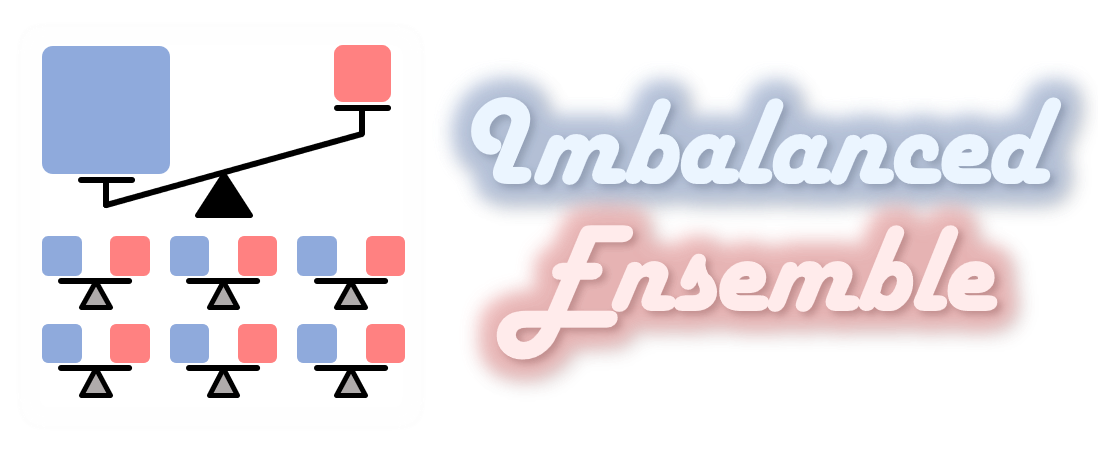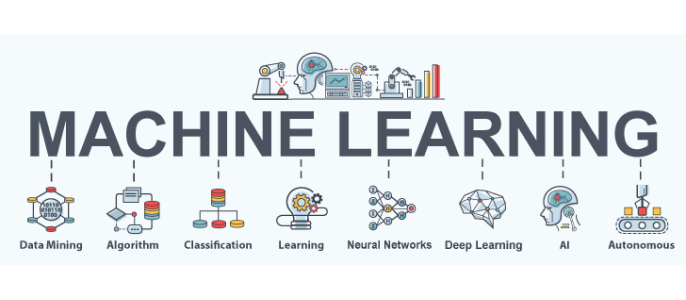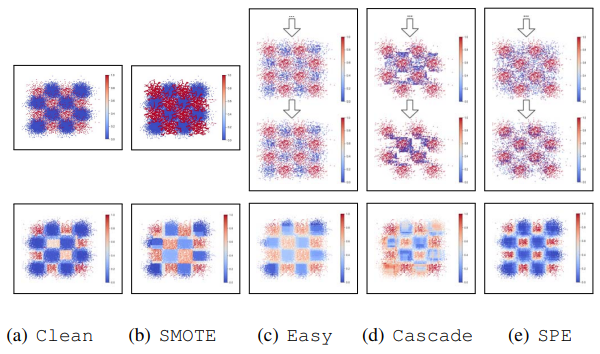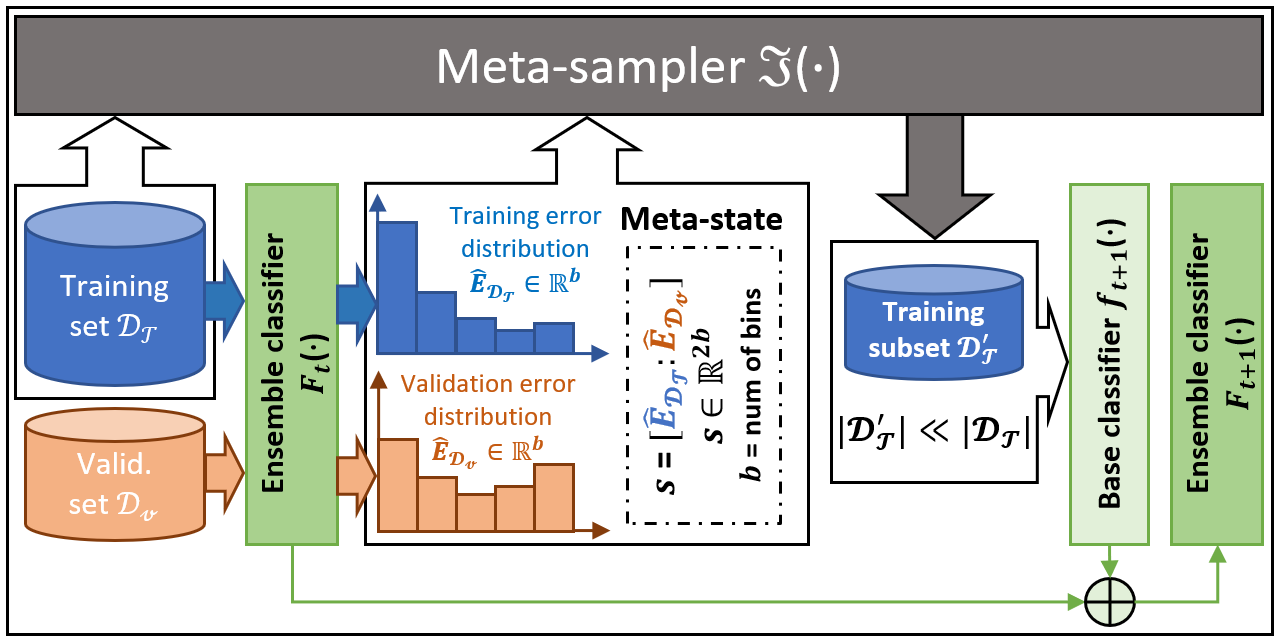类别不平衡(又称长尾问题)是指在分类问题中,类别之间的表示质量/样本数量不平等。类别不平衡在实践中广泛存在,例如金融欺诈检测、入侵检测、医疗辅助诊断等罕见模式识别任务。类的不平衡往往会导致传统机器学习算法的预测性能下降。类别不平衡学习旨在解决这一问题,即从不平衡的数据中学习一个无偏的预测模型。
本项目受 awesome-machine-learning 启发。在本列表中:
- 框架 和 库 按照 编程语言 分组。
- 研究论文 按照 研究领域 分组。
- 这个领域中已经有非常多的论文发表,所以本列表并不旨在详尽无遗。
- 本列表主要收录那些 有良好影响力 或者发表在 知名的顶级会议/期刊 上的工作。
提醒:
- ⭐ 如果此项目对您有帮助,请点一个STAR~ ⭐
- 如果您发现有任何不正确的、不合适的、过时的内容,请考虑open issue/PR。
- 我们非常感谢任何可能的帮助,Contributors✨一节中记录了所有贡献者!
查看 我 的其他开源机器学习项目!
 Imbalanced-Ensemble [PythonLib] 
|
 Machine Learning [Awesome] 
|
 Self-paced Ensemble [ICDE] 
|
 Meta-Sampler [NeurIPS] 
|
- 目录
- 框架与库 | Frameworks and Libraries
- 研究论文 | Research Papers
- 综述 | Surveys
- 集成学习 | Ensemble Learning
- 数据重采样 | Data resampling
- 代价敏感学习 | Cost-sensitive Learning
- 深度学习 | Deep Learning
- 综述 | Surveys
- 图数据挖掘 | Graph Neural Networks
- 难例挖掘 | Hard example mining
- 损失函数设计 | Loss function engineering
- 元学习 | Meta-learning
- 表示学习 | Representation Learning
- 后验概率校准 | Posterior Recalibration
- 半监督/自监督学习 | Semi/Self-supervised Learning
- 课程学习 | Curriculum Learning
- 双阶段训练 | Two-phase Training
- 网络结构 | Network Architecture
- 深度生成网络 | Deep Generative Model
- 不平衡回归 | Imbalanced Regression
- 异常检测 | Anomaly Detection
- 杂项 | Miscellaneous
- Contributors ✨
-
imbalanced-ensemble [Github][Documentation][Gallery][Paper]
NOTE: written in python, easy to use.
imbalanced-ensembleis a Python toolbox for quick implementing and deploying ensemble learning algorithms on class-imbalanced data. It is featured for:- (i) Unified, easy-to-use APIs, detailed documentation and examples.
- (ii) Capable for multi-class imbalanced learning out-of-box.
- (iii) Optimized performance with parallelization when possible using joblib.
- (iv) Powerful, customizable, interactive training logging and visualizer.
- (v) Full compatibility with other popular packages like scikit-learn and imbalanced-learn.
- Currently (v0.1.4), it includes more than 15 ensemble algorithms based on re-sampling and cost-sensitive learning (e.g., SMOTEBoost/Bagging, RUSBoost/Bagging, AdaCost, EasyEnsemble, BalanceCascade, SelfPacedEnsemble, ...).
-
imbalanced-learn [Github][Documentation][Paper]
NOTE: written in python, easy to use.
imbalanced-learnis a python package offering a number of re-sampling techniques commonly used in datasets showing strong between-class imbalance. It is compatible with scikit-learn and is part of scikit-learn-contrib projects.- Currently (v0.8.0), it includes 21 different re-sampling techniques, including over-sampling, under-sampling and hybrid ones (e.g., SMOTE, ADASYN, TomekLinks, NearMiss, OneSideSelection, SMOTETomek, ...)
- This package also provides many utilities, e.g., Batch generator for Keras/TensorFlow, see API reference.
-
smote_variants [Documentation][Github] - A collection of 85 minority over-sampling techniques for imbalanced learning with multi-class oversampling and model selection features (All writen in Python, also support R and Julia).
- smote_variants [Documentation][Github] - A collection of 85 minority over-sampling techniques for imbalanced learning with multi-class oversampling and model selection features (All writen in Python, also support R and Julia).
- caret [Documentation][Github] - Contains the implementation of Random under/over-sampling.
- ROSE [Documentation] - Contains the implementation of ROSE (Random Over-Sampling Examples).
- DMwR [Documentation] - Contains the implementation of SMOTE (Synthetic Minority Over-sampling TEchnique).
-
KEEL [Github][Paper] - KEEL provides a simple GUI based on data flow to design experiments with different datasets and computational intelligence algorithms (paying special attention to evolutionary algorithms) in order to assess the behavior of the algorithms. This tool includes many widely used imbalanced learning techniques such as (evolutionary) over/under-resampling, cost-sensitive learning, algorithm modification, and ensemble learning methods.
NOTE: wide variety of classical classification, regression, preprocessing algorithms included.
- undersampling [Documentation][Github] - A Scala library for under-sampling and their ensemble variants in imbalanced classification.
- smote_variants [Documentation][Github] - A collection of 85 minority over-sampling techniques for imbalanced learning with multi-class oversampling and model selection features (All writen in Python, also support R and Julia).
-
Learning from imbalanced data (IEEE TKDE, 2009, 6000+ citations) [Paper]
- Highly cited, classic survey paper. It systematically reviewed the popular solutions, evaluation metrics, and challenging problems in future research in this area (as of 2009).
-
Learning from imbalanced data: open challenges and future directions (2016, 900+ citations) [Paper]
- This paper concentrates on the open issues and challenges in imbalanced learning, i.e., extreme class imbalance, imbalance in online/stream learning, multi-class imbalanced learning, and semi/un-supervised imbalanced learning.
-
Learning from class-imbalanced data: Review of methods and applications (2017, 900+ citations) [Paper]
- A recent exhaustive survey of imbalanced learning methods and applications, a total of 527 papers were included in this study. It provides several detailed taxonomies of existing methods and also the recent trend of this research area.
-
Self-paced Ensemble (ICDE 2020, 20+ citations) [Paper][Code][Slides][Zhihu/知乎][PyPI]
NOTE: versatile solution with outstanding performance and computational efficiency.
-
MESA: Boost Ensemble Imbalanced Learning with MEta-SAmpler (NeurIPS 2020) [Paper][Code][Video][Zhihu/知乎]
NOTE: learning an optimal sampling policy directly from data.
-
Exploratory Undersampling for Class-Imbalance Learning (IEEE Trans. on SMC, 2008, 1300+ citations) [Paper]
NOTE: simple but effective solution.
-
AdaBoost (1995, 18700+ citations) [Paper][Code] - Adaptive Boosting with C4.5
-
DataBoost (2004, 570+ citations) [Paper] - Boosting with Data Generation for Imbalanced Data
-
SMOTEBoost (2003, 1100+ citations) [Paper][Code] - Synthetic Minority Over-sampling TEchnique Boosting
-
MSMOTEBoost (2011, 1300+ citations) [Paper] - Modified Synthetic Minority Over-sampling TEchnique Boosting
-
RAMOBoost (2010, 140+ citations) [Paper] [Code] - Ranked Minority Over-sampling in Boosting
-
RUSBoost (2009, 850+ citations) [Paper] [Code] - Random Under-Sampling Boosting
-
AdaBoostNC (2012, 350+ citations) [Paper] - Adaptive Boosting with Negative Correlation Learning
-
EUSBoost (2013, 210+ citations) [Paper] - Evolutionary Under-sampling in Boosting
-
Bagging (1996, 20000+ citations) [Paper][Code] - Bagging predictor
-
Diversity Analysis on Imbalanced Data Sets by Using Ensemble Models (2009, 400+ citations) [Paper]
-
AdaCost (ICML 1999, 800+ citations) [Paper][Code] - Misclassification Cost-sensitive boosting
-
AdaUBoost (NIPS 1999, 100+ citations) [Paper][Code] - AdaBoost with Unequal loss functions
-
AsymBoost (NIPS 2001, 700+ citations) [Paper][Code] - Asymmetric AdaBoost and detector cascade
-
ROS [Code] - Random Over-sampling
-
SMOTE (2002, 9800+ citations) [Paper][Code] - Synthetic Minority Over-sampling TEchnique
-
Borderline-SMOTE (2005, 1400+ citations) [Paper][Code] - Borderline-Synthetic Minority Over-sampling TEchnique
-
ADASYN (2008, 1100+ citations) [Paper][Code] - ADAptive SYNthetic Sampling
-
SPIDER (2008, 150+ citations) [Paper][Code(Java)] - Selective Preprocessing of Imbalanced Data
-
Safe-Level-SMOTE (2009, 370+ citations) [Paper][Code(Java)] - Safe Level Synthetic Minority Over-sampling TEchnique
-
SVM-SMOTE (2009, 120+ citations) [Paper][Code] - SMOTE based on Support Vectors of SVM
-
MDO (2015, 150+ citations) [Paper][Code] - Mahalanobis Distance-based Over-sampling for Multi-Class imbalanced problems.
NOTE: See more over-sampling methods at smote-variants.
-
RUS [Code] - Random Under-sampling
-
CNN (1968, 2100+ citations) [Paper][Code] - Condensed Nearest Neighbor
-
ENN (1972, 1500+ citations) [Paper] [Code] - Edited Condensed Nearest Neighbor
-
TomekLink (1976, 870+ citations) [Paper][Code] - Tomek's modification of Condensed Nearest Neighbor
-
NCR (2001, 500+ citations) [Paper][Code] - Neighborhood Cleaning Rule
-
NearMiss-1 & 2 & 3 (2003, 420+ citations) [Paper][Code] - Several kNN approaches to unbalanced data distributions.
-
CNN with TomekLink (2004, 2000+ citations) [Paper][Code(Java)] - Condensed Nearest Neighbor + TomekLink
-
OSS (2007, 2100+ citations) [Paper][Code] - One Side Selection
-
EUS (2009, 290+ citations) [Paper] - Evolutionary Under-sampling
-
IHT (2014, 130+ citations) [Paper][Code] - Instance Hardness Threshold
-
A Study of the Behavior of Several Methods for Balancing Training Data (2004, 2000+ citations) [Paper]
NOTE: extensive experimental evaluation involving 10 different over/under-sampling methods.
-
SMOTE-RSB (2012, 210+ citations) [Paper][Code] - Hybrid Preprocessing using SMOTE and Rough Sets Theory
-
SMOTE-IPF (2015, 180+ citations) [Paper][Code] - SMOTE with Iterative-Partitioning Filter
-
CSC4.5 (2002, 420+ citations) [Paper][Code(Java)] - An instance-weighting method to induce cost-sensitive trees
-
CSSVM (2008, 710+ citations) [Paper][Code(Java)] - Cost-sensitive SVMs for highly imbalanced classification
-
CSNN (2005, 950+ citations) [Paper][Code(Java)] - Training cost-sensitive neural networks with methods addressing the class imbalance problem.
-
A systematic study of the class imbalance problem in convolutional neural networks (2018, 330+ citations) [Paper]
-
Survey on deep learning with class imbalance (2019, 50+ citations) [Paper]
NOTE: a recent comprehensive survey of the class imbalance problem in deep learning.
- GraphSMOTE: Imbalanced Node Classification on Graphs with Graph Neural Networks (WSDM 2021) [Paper][Code]
- Topology-Imbalance Learning for Semi-Supervised Node Classification (NeurIPS 2021) [Paper][Code]
- GraphENS: Neighbor-Aware Ego Network Synthesis for Class-Imbalanced Node Classification (ICLR 2022) [Paper][Code]
- LTE4G: Long-Tail Experts for Graph Neural Networks (CIKM 2022) [Paper][Code]
- Semi-Supervised Graph Imbalanced Regression (KDD 2023) [Paper] [Code]
- Training region-based object detectors with online hard example mining (CVPR 2016, 840+ citations) [Paper][Code] - In the later phase of NN training, only do gradient back-propagation for "hard examples" (i.e., with large loss value)
-
Focal loss for dense object detection (ICCV 2017, 2600+ citations) [Paper][Code (detectron2)][Code (unofficial)] - A uniform loss function that focuses training on a sparse set of hard examples to prevents the vast number of easy negatives from overwhelming the detector during training.
NOTE: elegant solution, high influence.
-
Training deep neural networks on imbalanced data sets (IJCNN 2016, 110+ citations) [Paper] - Mean (square) false error that can equally capture classification errors from both the majority class and the minority class.
-
Deep imbalanced attribute classification using visual attention aggregation (ECCV 2018, 30+ citation) [Paper][Code]
-
Imbalanced deep learning by minority class incremental rectification (TPAMI 2018, 60+ citations) [Paper] - Class Rectification Loss for minimizing the dominant effect of majority classes by discovering sparsely sampled boundaries of minority classes in an iterative batch-wise learning process.
-
Learning Imbalanced Datasets with Label-Distribution-Aware Margin Loss (NIPS 2019, 10+ citations) [Paper][Code] - A theoretically-principled label-distribution-aware margin (LDAM) loss motivated by minimizing a margin-based generalization bound.
-
Gradient harmonized single-stage detector (AAAI 2019, 40+ citations) [Paper][Code] - Compared to Focal Loss, which only down-weights "easy" negative examples, GHM also down-weights "very hard" examples as they are likely to be outliers.
-
Class-Balanced Loss Based on Effective Number of Samples (CVPR 2019, 70+ citations) [Paper][Code] - a simple and generic class-reweighting mechanism based on Effective Number of Samples.
-
Influence-Balanced Loss for Imbalanced Visual Classification (ICCV 2021) [Paper][Code]
-
AutoBalance: Optimized Loss Functions for Imbalanced Data (NeurIPS 2021) [Paper]
-
Label-Imbalanced and Group-Sensitive Classification under Overparameterization (NeurIPS 2021) [Paper][Code]
-
Learning to model the tail (NIPS 2017, 70+ citations) [Paper] - Transfer meta-knowledge from the data-rich classes in the head of the distribution to the data-poor classes in the tail.
-
Learning to reweight examples for robust deep learning (ICML 2018, 150+ citations) [Paper][Code] - Implicitly learn a weight function to reweight the samples in gradient updates of DNN.
NOTE: representative work to solve the class imbalance problem through meta-learning.
-
Meta-weight-net: Learning an explicit mapping for sample weighting (NIPS 2019) [Paper][Code] - Explicitly learn a weight function (with an MLP as the function approximator) to reweight the samples in gradient updates of DNN.
-
Learning Data Manipulation for Augmentation and Weighting (NIPS 2019) [Paper][Code]
-
Learning to Balance: Bayesian Meta-Learning for Imbalanced and Out-of-distribution Tasks (ICLR 2020) [Paper][Code]
-
MESA: Boost Ensemble Imbalanced Learning with MEta-SAmpler (NeurIPS 2020) [Paper][Code][Video]
NOTE: meta-learning-powered ensemble learning
-
Learning deep representation for imbalanced classification (CVPR 2016, 220+ citations) [Paper]
-
Supervised Class Distribution Learning for GANs-Based Imbalanced Classification (ICDM 2019) [Paper]
-
Decoupling Representation and Classifier for Long-tailed Recognition (ICLR 2020) [Paper][Code]
NOTE: interesting findings on representation learning and classifier learning
-
Supercharging Imbalanced Data Learning With Energy-based Contrastive Representation Transfer (NeurIPS 2021) [Paper]
-
Posterior Re-calibration for Imbalanced Datasets (NeurIPS 2020) [Paper][Code]
-
Long-tail learning via logit adjustment (ICLR 2021) [Paper][Code]
-
Rethinking the Value of Labels for Improving Class-Imbalanced Learning (NeurIPS 2020) [Paper][Code][Video]
NOTE: semi-supervised training / self-supervised pre-training helps imbalance learning
-
Distribution Aligning Refinery of Pseudo-label for Imbalanced Semi-supervised Learning (NeurIPS 2020) [Paper][Code]
-
ABC: Auxiliary Balanced Classifier for Class-imbalanced Semi-supervised Learning (NeurIPS 2021) [Paper][Code]
-
Improving Contrastive Learning on Imbalanced Data via Open-World Sampling (NeurIPS 2021) [Paper]
-
DASO: Distribution-Aware Semantics-Oriented Pseudo-label for Imbalanced Semi-Supervised Learning (CVPR 2022) [Paper][Code]
- Dynamic Curriculum Learning for Imbalanced Data Classification (ICCV 2019) [Paper]
-
Brain tumor segmentation with deep neural networks (2017, 1200+ citations) [Paper][Code (unofficial)]
Pre-training on balanced dataset, fine-tuning the last output layer before softmax on the original, imbalanced data.
-
BBN: Bilateral-Branch Network with Cumulative Learning for Long-Tailed Visual Recognition (CVPR 2020) [Paper][Code]
-
Class-Imbalanced Deep Learning via a Class-Balanced Ensemble (TNNLS 2021) [Paper]
- Deep Generative Model for Robust Imbalance Classification (CVPR 2020) [Paper]
-
Semi-Supervised Graph Imbalanced Regression (KDD 2023) [Paper] [Code]
-
RankSim: Ranking Similarity Regularization for Deep Imbalanced Regression (ICML 2022) [Paper] [Code]
-
Balanced MSE for Imbalanced Visual Regression (CVPR 2022) [Paper] [Code]
-
Delving into Deep Imbalanced Regression (ICML 2021) [Paper][Code][Video]
-
Density-based weighting for imbalanced regression (Machine Learning [J], 2021) [Paper][Code]
-
综述 | Surveys
-
基于分类的方法 | Classification-based
-
One-class SVMs for document classification (JMLR, 2001, 1300+ citations) [Paper]
-
One-class Collaborative Filtering (ICDM 2008, 1000+ citations) [Paper]
-
Isolation Forest (ICDM 2008, 1000+ citations) [Paper]
-
Anomaly Detection using One-Class Neural Networks (2018, 200+ citations) [Paper]
-
Anomaly Detection with Robust Deep Autoencoders (KDD 2017, 170+ citations) [Paper]
-
-
imbalanced-learndatasetsThis collection of datasets is from
imblearn.datasets.fetch_datasets.ID Name Repository & Target Ratio #S #F 1 ecoli UCI, target: imU 8.6:1 336 7 2 optical_digits UCI, target: 8 9.1:1 5,620 64 3 satimage UCI, target: 4 9.3:1 6,435 36 4 pen_digits UCI, target: 5 9.4:1 10,992 16 5 abalone UCI, target: 7 9.7:1 4,177 10 6 sick_euthyroid UCI, target: sick euthyroid 9.8:1 3,163 42 7 spectrometer UCI, target: > =44 11:1 531 93 8 car_eval_34 UCI, target: good, v good 12:1 1,728 21 9 isolet UCI, target: A, B 12:1 7,797 617 10 us_crime UCI, target: >0.65 12:1 1,994 100 11 yeast_ml8 LIBSVM, target: 8 13:1 2,417 103 12 scene LIBSVM, target: >one label 13:1 2,407 294 13 libras_move UCI, target: 1 14:1 360 90 14 thyroid_sick UCI, target: sick 15:1 3,772 52 15 coil_2000 KDD, CoIL, target: minority 16:1 9,822 85 16 arrhythmia UCI, target: 06 17:1 452 278 17 solar_flare_m0 UCI, target: M->0 19:1 1,389 32 18 oil UCI, target: minority 22:1 937 49 19 car_eval_4 UCI, target: vgood 26:1 1,728 21 20 wine_quality UCI, wine, target: <=4 26:1 4,898 11 21 letter_img UCI, target: Z 26:1 20,000 16 22 yeast_me2 UCI, target: ME2 28:1 1,484 8 23 webpage LIBSVM, w7a, target: minority 33:1 34,780 300 24 ozone_level UCI, ozone, data 34:1 2,536 72 25 mammography UCI, target: minority 42:1 11,183 6 26 protein_homo KDD CUP 2004, minority 111:1 145,751 74 27 abalone_19 UCI, target: 19 130:1 4,177 10 -
Imbalanced Databases
-
imbalanced-algorithms - Python-based implementations of algorithms for learning on imbalanced data.
-
imbalanced-dataset-sampler - A (PyTorch) imbalanced dataset sampler for oversampling low frequent classes and undersampling high frequent ones.
-
class_imbalance - Jupyter Notebook presentation for class imbalance in binary classification.
-
Multi-class-with-imbalanced-dataset-classification - Perform multi-class classification on imbalanced 20-news-group dataset.
-
Advanced Machine Learning with scikit-learn: Imbalanced classification and text data - Different approaches to feature selection, and resampling methods for imbalanced data.
-
Anomaly Detection Learning Resources by yzhao062 - Anomaly detection related books, papers, videos, and toolboxes.
-
Paper-list-on-Imbalanced-Time-series-Classification-with-Deep-Learning - Imbalanced Time-series Classification
- acm_imbalanced_learning - slides and code for the ACM Imbalanced Learning talk on 27th April 2016 in Austin, TX.
Thanks goes to these wonderful people (emoji key):
Zhining Liu 💻 🚧 🌍 |
曾阿信 🚧 |
This project follows the all-contributors specification. Contributions of any kind welcome!






